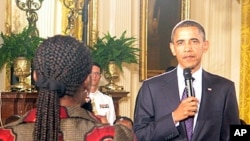U.S. President Barack Obama greeted 115 young leaders from 46 sub-Saharan African nations on Tuesday, in the first Young African Leaders Forum at the White House. The president addressed the questions and concerns of young people from across the continent.
President Obama spent an hour talking with some of the young leaders of African civil society, in an unprecedented forum in the East Room of the White House.
He called Africa "the youngest continent," and said that because a large percentage of Africans are under 30-years-old, his administration especially needs to reach the continent's young people.
"If all you are doing is talking to old men like me, then you are not reaching the people who are going to be providing the energy, the new initiatives, the new ideas," said President Obama. "And so we thought that it would be very important for us to bring the next generation of leaders together."
The president encouraged the young leaders to stand up for democracy, transparent government and freedom of the press. He said African men need to give women a bigger voice in the establishment of democracy.
"If you are part of an organization where you have professed democracy, but women do not have an equal voice in your organization, then you are a hypocrite," said Mr. Obama.
President Obama addressed questions about Africa's most troubled countries - Zimbabwe and Somalia.
Sidney Chisi, who founded the Youth Initiative for Democracy in Zimbabwe, raised a concern about abuses committed by his country's president.
"Robert Mugabe is still using the rhetoric of sanctions, racism, property rights abuse and human rights abuse, in violation of the rule of law," said Sidney Chisi.
Mr. Obama said he is "heartbroken" by the situation in Zimbabwe - a country, he said, that should be the "breadbasket of Africa."
"I think Mugabe is an example of a leader who came in as a liberation fighter, and - I am just going to be very blunt - I do not see him serving his people well," said President Obama.
The president said he would like to increase diplomatic and economic ties with Zimbabwe. But he said he fears that doing so would entrench Mr. Mugabe's rule.
The leader of the Somali Youth Leadership Forum, Abdi Najma Ahmed, then asked whether Americans are prepared to give financial and moral support to those working for democracy in Somalia.
"And being part of the diaspora that went back to risk our lives in order to make Somalia a better place - especially with what we are going through right now - how much support do we expect from the U.S.," asked Abdi Najma Ahmed.
Mr. Obama responded by saying that Americans and the U.S. government desperately want Somalia to succeed.
"I think you will have enormous support from the people of the United States when it comes to trying to create a structure and framework in Somalia that works for the Somali people," said Mr. Obama.
He said American and Somali interests intersect, which he also said is true of other African nations.
Shamima Muslim, who hosts a radio program in Ghana, said her listeners sometimes question the U.S. commitment to its relationships in Africa.
"Is America committed to ensuring a partnership that might not necessarily be beneficial to America, but [is] truly beneficial to the sovereign interests of the countries that we represent," asked Shamima Muslim.
Mr. Obama replied that the interests of the United States and Africa often overlap, and that America has a huge interest in seeing development across Africa.
"We are a more mature economy and Africa is a young and growing economy," he said. "And if you can buy more iPods and buy more products and buy more services and buy more tractors from us, that we can sell to a fast-growing continent, that creates jobs here in the United States of America."
The president also took questions from young leaders from Mali, Liberia, Mozambique and Malawi.
He said that while corruption is still widespread in some African countries, the continent is on the move, thanks to its inspiring young people.




